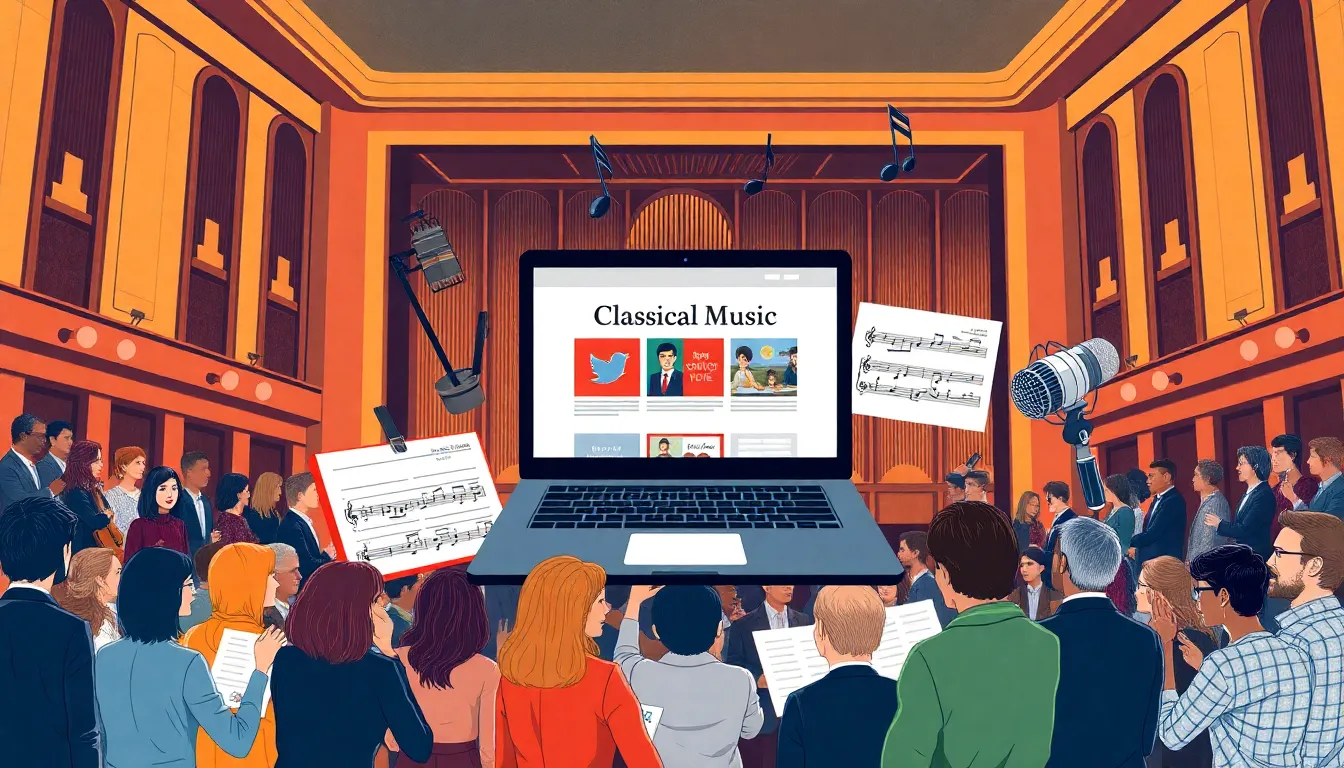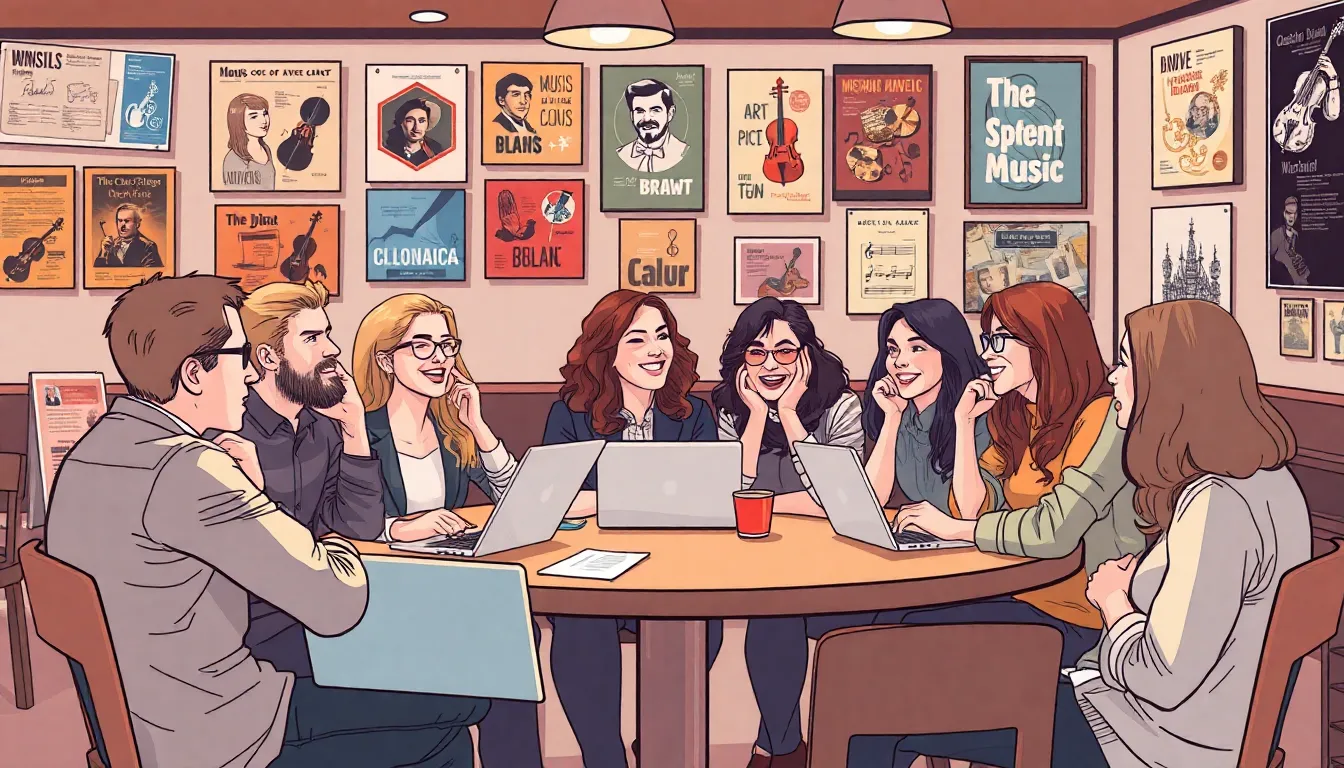Classical music might seem like a stuffy genre reserved for tuxedo-clad maestros and echoing concert halls, but it’s bursting with life and creativity. Classical music blogs are the hidden gems where passionate enthusiasts share insights, reviews, and the occasional meme about Beethoven’s hair. Who knew the world of symphonies could be so entertaining?
Table of Contents
ToggleOverview of Classical Music Blogs
Classical music blogs serve as important platforms for enthusiasts to explore and discuss various aspects of the genre. These blogs enrich the classical music community by providing insights, reviews, and engaging content.
Importance of Classical Music Blogs
Classical music blogs offer valuable perspectives that enhance listeners’ experiences. They help demystify the genre, making it accessible to new audiences. Blogs also provide a space for fans to connect over shared interests, fostering a sense of community. Enthusiasts can discover lesser-known composers and works through blogs. These resources keep readers informed about events, new releases, and trends in the classical music world.
Key Features of a Good Blog
A good classical music blog incorporates several essential characteristics. High-quality content engages readers and invites them to return for more. Regular updates keep the information fresh and relevant. Clear navigation enhances user experience, making it easy to find specific topics. Interactive elements, such as comment sections or social media links, encourage dialogue among readers. Blogs with a unique voice stand out and resonate more effectively with their audience.
Popular Classical Music Blogs

Numerous classical music blogs offer unique insights and engaging content. These platforms cultivate a rich community for enthusiasts seeking to deepen their understanding of this genre.
Notable Blogs to Follow
“Slipped Disc” stands out as a leading source for industry news and commentary. “The Classical Girl” provides refreshing perspectives on classical music through interviews and personal experiences. “Interlude” mixes classical music education with lively articles and multimedia resources. Each of these blogs contributes distinct viewpoints that enhance readers’ appreciation for classical music.
Emerging Voices in Classical Music Blogging
New bloggers are reshaping the classical music landscape. “The Rest Is Noise” presents thoughtful critiques and event coverage by passionate writers. “Classically Speaking” features discussions on contemporary issues affecting the classical world. “Musical Chairs” offers a fresh angle on artist interviews and album reviews. These emerging voices enrich the dialogue surrounding classical music, attracting new audiences and celebrating its evolution.
Content Types in Classical Music Blogs
Classical music blogs showcase diverse content that attracts and engages readers. These blogs often include reviews and critiques, interviews and features, among other types of content.
Reviews and Critiques
Reviews and critiques offer readers insights into recent performances, albums, and compositions. Blogs typically provide in-depth analyses, highlighting technical aspects, interpretive choices, and the overall artistic impact. Enthusiasts appreciate the expert opinions, which help them navigate the vast repertoire. Critiques often include comparisons to past performances, adding depth to readers’ understanding. Blogs may also explore emerging trends in classical music, informing fans about evolving interpretations. Engaging reviews stimulate discussions, sparking excitement around new releases and performances.
Interviews and Features
Interviews and features provide a personal glimpse into the lives of musicians, composers, and conductors. Blog posts often include candid conversations about artistic processes, inspirations, and challenges. Readers gain unique perspectives that foster deeper connections with the artists. These features may delve into background stories, shedding light on lesser-known facets of their journeys. Furthermore, engaging profiles highlight the significance of collaborations and projects. By showcasing the human side of classical music, blogs enrich readers’ experiences and deepen their appreciation for the genre.
Engaging with Classical Music Blogs
Classical music blogs foster vibrant communities where readers and writers interact. Engaging with these platforms enhances the overall appreciation of the genre.
Community Interaction
Community interaction drives discussions and exchanges among classical music enthusiasts. Readers often comment on posts, sharing thoughts that enrich conversations about performances and compositions. Bloggers frequently respond, creating a dialogue that strengthens connections among fans. Regular features like Q&A sessions or forums encourage participation, making it easy for newcomers to join the conversation. Community members also share personal experiences, fostering a deeper connection to the music. Such interactions create a supportive environment that welcomes all voices, enriching the classical music experience.
Social Media Presence
A strong social media presence amplifies the reach of classical music blogs. Platforms like Twitter, Instagram, and Facebook allow bloggers to share content rapidly, attracting wider audiences. Engaging posts featuring concert highlights or behind-the-scenes footage spark interest and drive traffic to the blogs. Bloggers often use polls and questions to engage followers, inviting them to share preferences and opinions. Collaborations with musicians or other bloggers create unique content, expanding networks and keeping followers informed about trends. Such active social media engagement maintains excitement around classical music, making it approachable for all.
Classical music blogs play a crucial role in reshaping perceptions of the genre. They break down barriers and invite new listeners to explore its rich tapestry. By offering diverse content and fostering community interaction these platforms enhance the appreciation of classical music.
As the landscape continues to evolve bloggers will remain vital in sharing insights and experiences. Their unique voices and perspectives contribute to a vibrant community that celebrates the beauty and complexity of classical music. Engaging with these blogs not only enriches individual knowledge but also strengthens the bonds within the classical music community.



